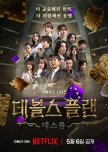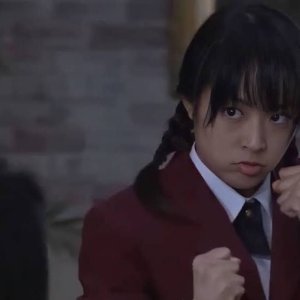
Underwhelming time slip drama: strong start, uninteresting midpoint, OK ending
The first episodes grip you in entirely as the series introduces the fantasy aspect through a time slip, right in the middle of an inciting incident—from here on and for the entirety of the series, the female lead navigates her second chance in life with a playbook as her compass.There were definitely plot devices and symbolisms used, but like other fantasy series, they were not elucidated as time slip is not the focus of the story, but merely an incident that sets off the story.
The first few episodes are also used to establish the female lead and male lead as the couple, which is one of the contributing elements to the romance in the series. However, once this has been introduced, the story’s focus deliberately shifts, with politics taking the centerpiece.
That being said, while there is romance in the drama (both for the main and secondary characters), this is not the main theme of the series. The romance is merely a subplot.
Casting Meng Zi Yi and Li Yun Rui, who have been constantly secondary leads in their previous projects, is not a bad choice, though.
Meng Zi Yi is not stiff and conscious when acting, while Li Yun Rui has the standard characteristics of a male lead. Li Yun Rui, though, still has a lot of areas to improve on, specifically in using his expressions.
I have no qualms with the pacing as it's pretty consistent throughout the series. Still, while the drama started off strong, the second half of the series hit a sharp decline in the quality of storytelling.
By the second half, I was struggling to keep my attention on the drama and was seriously considering skipping a few scenes just to fast track.
As the drama comes close to conclusion, nothing was making any impact anymore: writing was steadily becoming askew. And while the drama occasionally delivered good cinematography, the OST is mediocre at best and did not help elevate the experience in any scenes. The political turmoil plot alone cannot carry the entire series.
There was an effort to tie loose ends, and the ending was definitely conclusive, which is an important factor to the majority, but aside from introducing the potentials of Meng Zi Yi and Li Yun Rui as actors, and having a strong and smart female lead (with a good head on her shoulders) who actually (and finally) takes the lead (and is dominant in the relationship with the male lead), I will give this a pass. Romance, politics, time slip, rebirth—there are far better choices, with mid dramas that can easily topple this.

Fueled by adrenaline, ran low on substance
The premise alone of recruiting former world-champion athletes into a police task force sold it for me. The story was promising.However, during the first episode, the series struggled to find its footing. I couldn’t quite figure out how to follow its rhythm, and as a viewer, I couldn’t pin down the direction or tone it wanted to commit to.
Production-wise, it’s clear the budget was generous (there were a number of product placements), and the casting felt spot-on, but if I'm being honest, it took me quite an effort not to exit out during the episode’s first half. There were noticeable stumbles that discouraged me, but with patience and Park Bogum’s face as incentive, I powered through.
Instead of aiming for realism, the series leaned heavily into formalism—serving up both literal and figurative (scoring, lighting, OST, editing, etc.) punches to keep viewers hooked.
While I’m aware that this isn’t some introspective slice-of-life or youth drama, maybe expecting a more grounded, lifelike narrative is asking too much, because a lot of times, some scenes grew increasingly absurd. Watching the male lead, Yun Dongju, walk away from getting run over by a car, every brutal beating and blow, and a bloodied face without a tooth and hair missing felt more unconvincing than compelling as it tested the limits of believability.
There were also far too many missed opportunities. For instance, the antagonist had countless chances to take down the male lead but kept backing off for some reason. For a supposedly ruthless villain, that inconsistency felt jarring.
Of course, the plot needs its protagonist to survive, but the encounters could’ve been written in a way that added weight and meaning to their conflict instead of relying on sheer convenience.
Another letdown was the narrow focus on the two leads, Yun Dongju and Ji Han Na, and yet still failing to explore their characters with depth. For a story with such an ensemble setup, it also felt like a disservice not to dive deeper into the rest of the team—each former athlete clearly had a story worth exploring, and yet, they were barely given any room for their narrative to come alive.
The series also weaved in a political subplot, but since it never aimed for realism, the politics stayed mostly on the sidelines. Rather than a fully developed thread, it functioned more as a dramatic lever that is pulled when the conflict needed a little extra weight.
Fast pacing makes sense in an action-centric series, but the jumpy transitions between unresolved conflicts left noticeable gaps in the plot. It made the flow feel disjointed, almost like the show was sprinting without a clear finish line in sight.
What kept me watching through all of this was Park Bogum. And I say this sans bias for his (pretty) face.
This is only the second time I’ve seen him in a drama—the first being Reply 1988 more than a decade ago—and honestly, I was floored.
He’s transformed into an actor I didn’t know he could become. With every nuance and expression, he embodied a free-spirited character who’s been dragged through life’s worst yet continues to rise with reckless hope, warmth, and unfiltered kindness.
He wasn’t playing some groundbreaking role, and this isn’t a masterpiece of a drama, but his performance deserves recognition. He gave this story a soul it otherwise wouldn’t have had.
Aside from the solid fight scenes choreography and the action-packed sequences, what truly kept me invested was the special team itself. Somewhere along the way, I found myself rooting for them, wanting to see how their individual stories would unfold—this sentiment stems more from personal preference than from how the narrative was actually built.
Towards the end, the writers clearly scrambled to throw in a few plot twists before the resolution hit. By then, I’d already lost interest. The story had dragged on and spun in circles for far too long.
That said, this isn’t a series to watch with hopes of tightly written storytelling, deep character arcs, or clean resolutions. It’s best approached with minimal expectations on those fronts. To enjoy the series, it's best to lean into the adrenaline. Bonus: the last episode ends with all of the special team members alive.

An average transmigration fantasy, with decent writing, tied loose ends, and great leads chemistry
Production:The CGI, along with the set design, looked standard and there was nothing impressive about them nor were they unsatisfactory.
In here, costume design acts as a device to establish who the real main characters are: Miao Miao and Mu Sheng are the leads but have supporting roles inside the series’ novel/game, in which the entire plot is based on.
Miao Miao’s colorful and intricate wardrobe and makeup underlined her bright character, while Mu Sheng’s wardrobe and hair, made him stand out as the pretty male hero and protagonist—these set them apart from the secondary and supporting roles, who had a pretty bland color and wardrobe in contrast.
Storytelling:
The storytelling is not linear, but the transition and pacing still feel natural.
The story is engaging but the plot feels weak.
The writing is not perfect, but I admire the effort to weave together the plot and the different character arcs and connections—this is very tricky because without the consistency, the narrative will be overwhelmingly convoluted.
However, this type of plot leads to non-categorical interpretations, but personally, it’s not an issue since this is a fantasy genre, after all.
Despite this, the message is still pretty straightforward, especially in the first and last episode.
There was also an effort to tie loose ends, and ending does not feel rushed.
The characters are relatable and likeable as well, especially the female lead—this is actually the first time I find a female lead with a “bubbly” and “cute” personality pleasant.
Miao Miao’s character is bright, funny, and cute—typical traits of a female lead—but she was not devoid of thinking, understanding, and the ability of making choices. Personally, it’s has always been a miss for female leads of the same character type, but the writing made a good balance of charm and strength in her.
Mu Sheng, on the other hand, is extremely relatable as well, especially on his journey to learn about what it means to love.
Acting/cast:
Ding Yuxi became my first favorite Chinese actor and is now one of my favorite actors of all time.
He is a natural in using micro expressions and body language when portraying a character, and his eyes speak so loudly that the message has already been sent across even before he delivers his lines. He is also adept in making use of nuances.
This is my third Ding Yuxi series and I think that grumpy, tsundere roles suit him perfectly.
I personally think he is also made for costume dramas—beautiful face and right build (from scrawny Zhou Chuan in Moonlight).
Esther Yu makes a perfect Miao Miao. She was definitely made for the role.
The characters, including the secondary leads and supporting roles, are easy to love and they have good chemistry in general.
Music:
The OSTs are good, with soundtracks done by Ding Yuxi and Esther Yu themselves. The lyrics are very fitting for the both the plot and the genre.
Even with a fairly limited music in the series, the team made a good use of them to enhance the mood of the scenes.
Overall:
The series received polarizing reviews, and understandably so—while the story could appear straightforward to some, different interpretations are inevitable, particularly on the last episode and ending.
While the series offered nothing special, it is still a decent and worthy watch, especially if you are looking for a good binge.

A legend lost in the making
I honestly don’t even know how to write a proper review for this series, especially knowing that around 70% of the script was reportedly cut and never made it to the final release.I waited a year for this. Alongside other fans who grew increasingly impatient, the hype and expectations naturally skyrocketed. So it’s with a bit of guilt that I say it was a major letdown. And I’m not blaming the cast. I’m not even sure it’s fair to point fingers at the crew behind the scenes.
The cast did well. The leads, in particular, gave solid performances—their portrayals felt natural, and their chemistry was genuinely palpable. The character foundations were strong and consistent: both leads were smart, capable generals with a shared past that tied them together.
I appreciated how their decisions aligned with who they were. They’d die for each other, yes, but they also refused to be the chains that held each other back from duty and ambition. The romance was more realistic yet still gave you butterflies.
But the disappointment lies in knowing there was supposed to be more in the series. You can definitely feel the absence of something.
The transitions between scenes are jagged, the pacing off, and the script feels unnatural and weak. So many moments just don’t make sense. Like, how can the characters casually approach the king, reveal something, and suddenly gain favor? How does the king pardon so easily? How do things fall perfectly into place after a few mishaps and struggles?
I also don’t mind predictability. With the sheer volume of content out there, it’s hard to avoid. But I do wish there had been a stronger buildup, something that explored the themes deeper and gave the story more weight.
The only real strength of this series is the cast, especially the leads. Everything else suffers from small issues that snowballed into a major miss.
It genuinely feels like the production team was scrambling to keep things afloat the entire time, throwing in whatever they thought might work.
Honestly, I feel sorry for the cast. After all the delays and behind-the-scenes struggles, they were weighed down by issues beyond their control.

Can be a good palate cleanser when overwhelmed with convoluted plotlines
The series has no compelling story, but the cliche still worked.- It's light, easy, and simple, but fast-paced.
- Pretty straightforward in the story structure and it does not try too hard.
- No complicated conflicts and massive plot twists.
- Decent fight scene choreography.
- Song Weilong decently portrayed a wise prince, commanding general, and a lovesick husband, but I find Bao Shangen's expressions lacking in her character portrayal.
- I dislike childish characters and have no tolerance for them, but the imperfections incorporated into the FL's character greatly depicts a realistic noble woman in ancient times, which is refreshing.
All in all, it's not memorable, but it's neither good nor bad. Still, the ending has a conclusive dot/period, which is pretty satisfying.

Could've been the next best xianxia but lacks (proper) groundwork
I am a huge fan of both fantasy and romance genres. So much so that I do not mind clichés and overly used tropes. In fact, in terms of worldbuilding, I do not mind suspending disbelief, sometimes to even an incredible extent, as long as both the execution and writing are good and static.I tried to understand Moonlight Mystique’s overall direction because the first episode really made me look forward to how it will pan out. While watching the first episode, I was actually reminded of Love Between Fairy and Devil, my first xianxia (which remains to be one of my favorite dramas of all time).
I didn’t mind the similarities. Actually, it was because of the resemblances that I had high hopes: misunderstood, “unsympathetic” ML who carries the weight of responsibilities, a nobody FL, demons, deities, revenge, pain, grief, good vs evil, justice…
I really had high hopes, but as the story progresses—you don’t even need to reach far out—the terrible writing becomes increasingly evident:
Plot
– I understand that a plot may carry subplots, with storylines having multiple narratives. It’s xianxia, after all. But the way these were simulated did not provide any impact and depth.
The writer had a thing in their mind, and I know that the vision is there. But the writer did not know where to go and how to get there, that it has become difficult to establish connections with the story and characters.
Characters—
FL
– Her character is inconsistent. Yes, she was initially arrogant and selfish, which is needed for her character development to materialize, but I find her anger towards SML is often misplaced and out of character, as someone who “values” family and ties.
I understand that SML is not perfect, was coerced into lying multiple times, and is not the best in decision-making. But ultimately, he was really left with no choice and the choices he made were the best ones among those handed to him. Which is why I don’t understand the deeply-rooted resentment the FL has for SML, when in fact, the FL did not deserve to act righteously at all during the first episodes.
– It was established from the onset that the FL’s motivations are grounded on repaying (kindness for the immortal who saved her and her sister) and revenge. These two were rather dissolved quickly, without a good exit.
Yes, the redirection was inevitable, but it was done haphazardly that it felt like cutting the characters from one scene and putting them onto the next sequence just so the story could continue.
SML and SFL
– The SML’s shift from one love interest to another feels unnatural.
The trope is enemies to lovers, but the change was too abrupt that it felt like their love story is more implied.
Editing
– The use of echo to reiterate, exaggerate, and highlight a character’s lines and the “swoosh” as a transition are a miss.
I first encountered the use of echo in a dialogue in Story of Kunning Palace (2023) and it was… ok.
For this series though, rather than amplifying the supposed to be emotional impact of a dialogue and a scene, it came out ridiculous and utterly unnecessary.
Ending
– Again, I am able to suspend disbelief adequately. I can even tolerate plot holes to a certain extent, as long as the writing and execution are good, and consistency and depth are there to establish enough emotional investment.
I am even more tolerant on these when it comes to xianxia, as they use reincarnation as an element to tie loose ends.
So, using reincarnation or second chances as a way to have a happy ending is not an issue at all. This actually gives the writer plenty of elements to play with as well. But Moonlight Mystique’s ending is so terrible that a happy ending cannot compensate it.
So, the ML willingly sacrificed his life for the greater good and to ultimately eradicate evil. Heartbreaking, but sounds good.
Time passed, and the FL traveled around the world and achieved so many things by herself—good, this is consistent with her character.
And then, the heaven reached out to FL and told her that “Those who died for the great cause will eventually return in another way." Ok, seems fair.
But a few moments later, as in after a few seconds, you can literally see the ML emerging from who knows where, walking on the water, towards the FL, for the reunion and happy ending—WHAT?
Even as a hopeless romantic, I still cannot let this pass—I need the why AND how.
It is a fantasy, but I need a motive. An effect that has sprouted from a missing cause only ruined their entire tribulation.
They could’ve used something to set off the resurrection: a surviving strand of soul or a part of a demon core of ML that overcame death. Whatever remnants—heck, a nail or a strand of hair would do— or explanation, I am willing to accept, but this? NO.
Also, it’s not only the ML who died for the greater good. There are plenty of characters who died fighting evil. Why are they not resurrected and walking on the water with ML?
It is a happy ending, but I’d rather have an open ending or a sad ending if this is how ridiculous the conclusion is.
I could only muster enough emotional connection with the characters, but the ending diminished it to a huge degree.
There are not only bad things in the series, though, as there are aspects where it surprisingly delivered well:
OST
– The OST is hauntingly beautiful that it could actually compensate for the unsteady writing and bad execution. Instead of the writing, the OST carried the storytelling on its back—it did not elevate the experience. It’s an experience in itself.
Ao Rui Peng and Bai Lu
– The chemistry between Ao Rui Peng and Bai Lu is there.
Ao Rui Peng is one of the pleasant surprises that this series has to offer.
Bai Lu is a good actress, and while Ao Rui Peng’s character portrayal has room for improvements, he does not lag behind Bai Lu’s performance at all.
Chang Hua Sen and Dai Lu Wa
– The actors cannot do anything with the terrible writing, but I find their character portrayal decent. They made the best out of it so they can transition well from one character to the next.
Chang Hua Sen’s portrayal of Chong Zhao and Hidden Lord is pretty good as well. You could tell which character he’s trying to portray based on his demeanor and facial expressions.
Lead’s relationship dynamic
– The good thing about the leads’ relationship is their effort to communicate, which eliminates unnecessary misunderstanding.
When the ML realized his growing feelings for the FL, his first thought was to sit down with FL to talk and settle this, which is quite an uncommon trait for any xianxia characters.
The development of their relationship is lacking, but both leads try to communicate with each other, which makes their relationship healthy.
In general, I think this could have been one of the best xianxias, but is ruined because of terrible groundwork and writing. All things considered; it is still a quite enjoyable watch.

As an ELF and a variety show noob...
I’m not a variety show person and my only exposure to Korean variety is Super Junior shows (as a long-time ELF) and The Return of Superman (first batch only).I do not have interests in variety shows, let alone mind games, and I prefer a work of fiction (dramas). I only picked this show up because of the massive backlash some of the players have been receiving.
Of course, as an ELF and a Kyupiter, I felt the obligation to figure out why, most especially since Kyuhyun was worried about how fans would perceive him after the show concludes.
And I honestly don’t know what he was worried about.
The Devil’s Plan Death Room is a survival show that encouraged betrayals and forming alliances against each other. It was not categorically stated, but it was clear that the show wanted to stir up something among the players, so that their primal instincts were to secure their survival per game and that’s what happened.
I tried watching without bias, and after a few games, I figured how Kyuhyun was clearly not the best and top player from this batch. In the games, he did not come out on top, nor did he shine among the other players. And I say this in a good way.
Kyuhyun, while not entirely irreproachable, said that the reason why he lost was because he was too self-righteous. And he is correct. While his wit couldn’t surpass other player’s schemes, his (true) character shone. He was loyal to his alliances, but he sincerely looked after everyone, including those who belonged to the other team(s), groups, and cliques.
Every morning, without fail, he would prepare protein shakes for the prison team. He would apologize to other players after a game, and he adapted two ducklings (that’s what I like to call them, as Sohee and Hyungyu would follow him around) and found a solid alliance with them, including Tinno—I can confidently say that this friendship would extend outside the show.
I breathed a sigh of relief, as Kyuhyun’s worry was completely unnecessary because watching the show actually made me love him more. As a fan, it made my chest swell with pride because I know I’m stanning the right person.
Kyuhyun aside, I was surprised how I have absolutely enjoyed the show.
I cannot be way too rational about the games, as I am a right-brain dominant (haha). I could only focus on the writing and sound design, and they were excellent.
The storytelling is not linear, which was a surprise for me as this is a reality show, and the critical details would be revealed at the most perfect time. This is a good technique to build tension and excitement.
There is definitely nothing new to the concept, but all players were determined to win, and the show was so good in increasing tension and conflict that it will get you too emotionally involved. This would make a really good binge, and it will leave you absolutely satisfied with how things ended.
With that, the thing that makes me feel like a fish out of the water is the number of criticism and hate, especially towards Hyungyu (the winner), Sohee, and Kyuhyun—they are all unwarranted and misguided, as if the haters watched a completely different show.
Nonetheless, this show has also opened up a new interest for me to explore—variety shows.

The plot? Just tropes on autopilot
I’m a sucker for clichés and tropes, and I genuinely like Jung Somin and Choi Wooshik, especially in romcoms. The setup had everything going for it, so I can’t wrap my head around how this series turned into such a mess.The writing is so weak that even the actors’ talent can’t save it. There’s a scene—the classic “accidental fall” moment—that’s been done to death in romance. But here, it was executed so poorly. No transition, no buildup. Just a clumsy insert that felt like the writer threw it in last minute. It was predictable, awkward, and completely mishandled.
Both leads have emotional backstories, yet somehow none of it lands. I’m not even confused anymore. It’s just really bad writing. There’s no emotional weight. At all.
And don’t get me started on the female lead. Her character is a mess. I get that the show’s supposed to be lighthearted, so maybe the trauma isn’t meant to be heavy. But for someone who’s been through heartbreak and hardship, she shows zero growth. Not even a flicker of development.
Her dynamic with the ex is maddening. She’s furious about being cheated on, yet she still entertains him. Even in fiction, it makes no sense.
I fast-forwarded through episode 10 and barely found a few minutes worth watching. And that’s me being generous.
Honestly, I’m more curious about the second leads. But if this is the kind of writing I’ve endured for ten episodes (can we still call it “initial impressions”?), I doubt there’s much left to redeem.

A good take on revenge and romance
Positive1. Strong character writing and relationship dynamics
This is the series’ strongest point.
- Fu Yi Xiao
She’s the most convincing female general I’ve seen. A traumatized girl who grew up strong and wise to survive—that’s it. No personality shifts when she’s with the ML.
- Fu Yi Xiao and Feng Sui Ge
This is a textbook enemies-to-lovers arc.
They were literally at each other’s throats and began with a transactional relationship. While the transition to romance is weak, their dynamic as a couple is healthy, marked by boundaries, trust, and good communication.
- Fu Yi Xiao and Xia Jing Shi
I’m glad they didn’t push the ex-lover trope with lingering, unexplored feelings. When they reunited, there was no confusion.
Xia Jing Shi was still caught up in the past, trying to resolve it, but Fu Yi Xiao was firm. No emotional ambiguity. She was sure of her feelings and stood by Feng Sui Ge.
- Feng Xi Yang and Xia Jing Yan
A transactional relationship that tipped into unrequited love.
I appreciate how they handled this without the “I can change this person” or “I’ll change for love” cliches. Realistically, not everyone falls in love just because the story demands it.
Xia Jing Yan stayed true to his archetype: a foolish, selfish, ruthless emperor who simply fell in love. No transformation arc, no redemption fluff. He just fell.
Similarly, Feng Xi Yang didn’t return his feelings, but she didn’t act out of character. She showed care, without romantic undertones.
2. Revenge is revenge
As mentioned, the leads were genuinely at odds. They physically hurt and plotted against each other, and this is definitely one of the most convincing revenge plots I’ve seen.
The angst is definitely present, but it’s not exhausting for viewers, which I really like.
3. Fu Yi Xiao’s amnesia arc
I love how this arc didn’t drag. It was straightforward. The FL and ML were enemies, and the resolution reflected that. No convoluted relationship threads or unnecessary drama.
4. Consistent, straightforward writing
This may seem minor, but it’s worth celebrating. Many recent dramas struggle with consistency, and this one mostly delivers.
5. Cast
The entire cast (major and minor roles) did a great job portraying their characters.
6. OST
There aren’t many tracks, but the OST is strong. I don’t mind the lack of variety. Personally, I’d rather have a few emotionally resonant songs than a dozen forgettable ones.
Middle
1. Feng Sui Ge’s Casting
I wasn’t sure about Chen Zhe Yuan at first. His acting is good, but I questioned the casting choice. Eventually, though, he grows on you.
2. Lead Chemistry
While I praised their relationship dynamic, their chemistry is unfortunately lacking. Personally, I didn’t feel any romantic spark between Li Qin and Chen Zhe Yuan.
Individually, they performed well, but together they felt more platonic, like two people bonded by trauma, hardship, and memory loss.
3. Lighting
Some scenes are well-edited, but others are visually distracting, especially due to lighting.
I’m not a fan of spotlight-style lighting against characters. While it works in some scenes, it’s overused and often unnecessary.
4. Fight Choreography
Inconsistent. Some scenes are strong, others fall flat and feel unconvincing.
Negative
1. Unnecessary arcs
The series started strong but dipped in the middle due to unnecessary arcs: the Storm Alliance and Feng Sui Ge’s amnesia arc.
Yes, there are two amnesia arcs. I was on the fence about the trope, but the first one worked well. The second, involving the ML, added no value.
The Storm Alliance subplot also felt irrelevant. I skipped those scenes and still understood the overall plot.
2. Murong Zhong’s corpse
I can’t believe I have to dedicate a bullet to this, but there’s one ridiculous scene where Murong Yao lays his father’s corpse aside to confront Feng Sui Ge.
In the middle of their fight, Murong Yao is thrown toward his father and suddenly, the corpse is sitting upright. What in the horror-movie editing lapse was that?
The positives definitely outweigh the negatives, though. So while it’s not a personal favorite, it’s still objectively a solid drama.

An almost cathartic masterpiece packed with punches that fell short
CinematographyThe stunning visual style is pivotal in the series, and the bar has already been set with the cinematography alone.
The CGI is of high-quality, and the camera work is very intentional: I have observed the use of motivated camera movements and shot lengths, which were very effective and highly compelling in setting a scene.
They also played with color gradings and lightings that enhanced the visual experience, with many scenes looking like an artwork—clearly, the exceptional cinematography is the strong suit of the series.
Editing
One thing I noticed is that the transition from one scene to the next is not always seamless and the cuts of some scenes are not smooth.
Another thing to note is that while the OST is perfect, the background score is sometimes misplaced.
While these are not entirely major issues, these have affected the mood and the tone of some scenes.
Story
The thing with the genre of fantasy and wuxia is that their realm is so vast, that there are plenty of elements to play with to make a story compelling, cliche or not.
The series started strong; however, I find that something is amiss in the writing, making it and the pacing inconsistent all throughout the show.
The characters are both relatable and likeable, but I feel like they could have been written more with depth.
Case in point: Wen Xiao being identified by the characters as "kind" and "selfless". However, as a viewer, there was no opportunity to establish this because her character was not properly explored. With this, I only associate Wen Xiao to being "kind" because it was what the characters have taught me, and not something that I have determined myself as an audience.
I was only able to identify the characters' traits and understand their motivations because it was what the writers were spoon-feeding me.
A good (or even mid) writing would have explored the characters' backstory so the viewers themselves can see and establish how the characters' actions and decisions are shaped.
On the other hand, I found good quotable quotes in the characters' dialogues so it's not that entirely bad.
I can also detect the presence of some queer undertones in the story. This is especially evident in the relationship and interactions of Zhao Yuan Zhou and Zhuo Yi Chen, making the romance aspect with Wen Xiao secondary to almost non-existent.
Acting/Cast
The entire cast has chemistry, and it shows.
Two actors who stood out for me were Neo Hou and Tian Jia Rui.
Neo is an excellent actor who uses his body language and micro expressions to portray a character. Some expressions are very subtle, making it look so natural.
Tian Jia Rui is very charismatic and has good emotion and energy control when portraying a character. I know that he is destined for big things, and I look forward to his upcoming projects.
Music
The best! The OSTs are a narrative on their own and yet they greatly enhance the mood and emotions of the scenes.
The excellent cinematography of FoF paired with its great OSTs definitely create an immersive experience for the audience.
Overall
This is definitely one of the best series to come out this year. A masterpiece in terms of cinematography and soundtrack.
While the series fell short in writing, the cast did a good performance in character portrayal, making the watch a fairly good experience.

Unassuming but unforgettable slice-of-life gem
In a time where everything feels the need to be loud and larger-than-life, this drama didn’t try to be something it isn’t just to leave an impact. Instead, it remained grounded in its message of healing—quiet, steady, and deliberate, moving at its own pace with a clear sense of direction.The narrative didn’t lean too heavily in one direction. It struck a thoughtful balance between romance and the broader strokes of life, introducing each theme with just the right timing.
The central conflict stayed well within the premise, and the series never felt the need to chase grand twists or forced tension just to hit a dramatic peak.
I like how romance wasn’t shoehorned into every storyline, either—new beginnings unfolded differently for each character, reminding us that life doesn’t offer the same arc to everyone.
The healing journey is centered on the women of the Yoo family. Their life and struggles were gently unpacked, layer by layer, allowing for honest confrontation without ever feeling imposed. And as they slowly found their footing, we are also invited into the quiet, personal reckonings of other characters who are walking their own paths.
As mentioned, the drama didn’t force its message, but it gave each character space to breathe. It also underlined that not all healing journey wraps up neatly—some characters remained on uncertain paths, simply choosing to move forward.
My favorite scenes will always be the ones shared between Miji and her grandmother. The series used such a poignant visual metaphor to tell their story: while Miji was confined in her room for years, wrestling with her pain, it was her grandmother who continued to bring her back slowly, patiently. And when it was her grandmother’s turn to start her own journey, it was Miji who gently helped her into her shoes, ready to see her off as she went home.
The one thing that left me wanting more was how little screentime Sejin received. His arc could have beautifully complemented the story’s core, especially with the struggles he went through.
As a male character, he was honestly a breath of fresh air and, dare I say, more compelling than the male lead. His moments with Mirae were cautious and gentle, yet firm when needed. He respected her space and boundaries, acknowledged her without prying, and brought warmth that never overwhelmed. It’s a shame he wasn’t given more room to unfold.
Still, this series came to me at just the right time. It offered me quiet comfort and warmth when I found myself retreating into my own room like Miji. And like Miji's grandmother, it doesn’t barge in with answers. It simply finds you where you are and offers a soft, steady hand on your shoulder.
Whether you’re a slice-of-life fan or just someone in need of something worthwhile that is real yet kind, this one will reach out to you and carve out a quiet space in your heart.

From decent beginnings to a decline too steep
As a Ding Yuxi fan and a die-hard romance enthusiast, I couldn’t pass up the chance to see Yuxi don a historical outfit once more, step into the role of a general, and showcase his award-winning eye acting. Beyond that, I was equally eager to watch Victoria Song take on the role of an actress. As a second-gen Kpop fan, I was excited to consume content that felt reminiscent of my old Kpop days. Unfortunately, that excitement ended there.I genuinely liked the premise. While in-law dynamics in romance aren’t usually my preference, I was curious to see how the characters would navigate the setup, how the writers would play with the format, and how the relationships would challenge social constructs.
The character archetypes themselves were unconventional: the series was heavily female-driven, and the female lead held more dominance than the male counterpart. This was a critical choice—a commendable attempt to break away from historical drama formulas where women are often portrayed as conservative, meek, and weak. Yet, ironically, this very choice contributed to the series’ downfall.
Without prior references to compare, I can’t say whether behind-the-scenes issues played a role, but Victoria’s portrayal was deeply disappointing. As much as I wanted to celebrate the nostalgia of Kpop’s golden age, I couldn’t find a single redeeming quality in her performance. It was, quite simply, extremely poor.
The performance issue becomes especially glaring when set against Zhou Jing Tao’s earlier work in A Journey to Love, another female-centric drama that featured one of the strongest female characters I’ve encountered. That series delivered a powerful and compelling female-led narrative. Which is why, in this case, I’m left questioning what went wrong.
Victoria’s acting was so ineffective that, without context or cues, I couldn’t discern the emotions she was trying to convey. She cried—the tears were visible—but as an audience member, I felt no sorrow, no sadness, no trace of what those tears were meant to express. Worse, she failed to establish any chemistry with Ding Yuxi.
From both romance and non-romance series I’ve seen, Yuxi has never struggled to build chemistry with his co-stars. Yet here, the best they managed was a camaraderie that felt flat and unconvincing. In fact, the tension and chemistry between Yuxi’s character and the second male lead were far more palpable.
The writing itself wasn’t terrible, but it wasn’t strong either. It lacked hooks, emotional impact, and staying power. The characters and their archetypes felt inconsistent, leaving them forgettable. Average at best.
Ironically, the saving grace of the series came from the subplots and secondary characters. They were richer, more layered, and offered good character development. Their romances were far more compelling. The grand princess Li Changming’s tragic story with Hanmei/Zhaoye, for instance, could easily stand alone as a lead-worthy narrative — one that eclipsed the main storyline entirely.
As a Ding Yuxi fan, I managed to finish the series, but I also owe that endurance to the secondary characters. Their arcs weren’t filler; they provided the missing elements the leads failed to deliver.

Familiar tropes meet solid execution and storytelling
The perfect blend of tried-and-tested tropes paired with solid, consistent writing, well-paced storytelling, and commendable technical execution. Shadow Love easily earns its place as one of the strongest romance period dramas of the year.I honestly don’t even know where to begin because there’s just so much to rave about. Sure, the drama has its fair share of hiccups and lapses (I still can’t wrap my head around how the female lead’s blood ended up being swallowed by the male lead during the first part, plus a few other questionable scenes), but these are more than compensated for by how well the series fares overall.
The premise—two powerful generals from opposing states, a dash of fantasy, an amnesia arc and personality shifts, and well-written secondary characters—isn’t groundbreaking. But what makes it work is the consistency in direction, writing, and pacing.
I’ve seen my fair share of historical fantasies and dramas that use “breather” scenes, probably for the sake of character downtime or viewer relief, but they often add little to the plot and end up making half—or worse, an entire—episode feel like a filler. Shadow Love doesn’t fall into that trap. Every part is decisive, pushing the narrative exactly where it needs to go. No unnecessary arcs, no wasted time.
The character writing remains consistent, even with the inclusion of the amnesia subplot. The male lead’s personality shift—uptight and emotionally closed off before the arc, then suddenly carefree and free-spirited during it—could’ve felt jarring or incongruent. But it’s thoughtfully supported through a conversation between the male lead and his brother Emperor Wencheng. It’s a detail I appreciated, especially since shows often leave viewers to fill in gaps themselves.
I also loved how they wrote Crown Prince Su Mu Yang. He’s a morally gray character, and his internal conflict is decently fleshed out.
The secondary characters weren’t sidelined, either. They had meaningful development that added crucial weight to the plot, which is refreshing, especially since secondary characters are often treated as mere ornaments in the series.
From a technical standpoint, the execution is also really impressive for a series.
The use of camera work to emphasize mood and subject was thoughtful. The shots weren’t overly reliant on set design, and the camera movements added emotional depth to scenes.
The lighting wasn’t spectacular, but it was well-utilized and never overbearing—a highlight for me, especially given the awkward lighting choices I’ve noticed in recent historical dramas.
The musical cues were spectacular. The OST is strong, and the timing of each track was precise, elevating the storytelling in key moments.
This good execution was especially evident during Xuan Yi Ke’s transformation scenes. The CGI, music scoring, and acting came together beautifully and it ended up as one of the most stunning transformations I’ve seen in a drama.
Acting-wise, I have to spotlight Cheng Lei. Admittedly, there’s a bit of bias here, but beyond my growing admiration for him, I’m genuinely impressed by his performance.
He portrayed three characters in this series: Duan Ao Deng /Prince Annan, Jin An, and Xuan Yi Ke /masked black man. And while the shifts were subtle, you could clearly see the nuanced differences in each role.
Coming from Legend of the Female General, I can also say he has a knack for building strong and good chemistry with his leading lady.
I was also pleasantly surprised by Bi Wen Jun’s portrayal of Crown Prince Su Mu Yang, a dual-role character. I’ve always seen Bi Wen Jun as the standard male lead, but his take on the anti-hero was unexpected and shows he’s a flexible actor.
As for the ending—it’s a no-brainer, kind of predictable, but this is not a miss. There is a difference that lies in the writing. The writer knew exactly where to take the audience, so the execution wasn’t messy as it flowed well and wrapped up cleanly.
Overall, while the premise leans on familiar tropes, what makes Shadow Love stand out is that the writer never underestimated its audience. They took those well-worn formulas and elevated them with strong technical execution, resulting in a series that truly shines among its contemporaries this year.

It's Super Junior in their own variety show—what more could I ask for?
Ten episodes might seem underwhelming for a 20th anniversary celebration but considering their individual and sub-units schedules and commitments, I can definitely see how much effort was put into putting this show together.You only need one Super Junior member to make a show fun or interesting. And if you get all (active) members together (yes, including Heechul!!) in one show, then you’re in chaotic, fun, and memorable ride.
Truly with Super Junior, expectations are exceeded, especially when it comes to group contents and variety shows. The production staff and the members definitely tried to put all the fans’ and members’ suggestions into one season, and although they don’t get to tick off everything from the list, there were no dull moments and everything was just fun.
The activities they did were fun as always, but more than that, I’m just happy to see how the members always feel much happier and at ease whenever they’re together.
The third season wrapped up really nicely with a touching yet fun activity, which takes me back to how they started—dorm life.
Good luck on the 20th anniversary preparations, Super Junior. Hoping for more seasons of Super TV!

Keeps you interested only to a good stretch; emotional grip will (barely) keep you until the finale
In my review on its first season, I mentioned that I chose to keep watching until the end because of the characters.Well, that didn’t fare well for me as I found my interest steadily waning as the story progresses, to the point that I heaved a sigh of relief once I finished the last episode.
To finish the second season, there was a lot of fast-forwarding that happened, and it took me a lot of effort to stay focused on the screen.
Consistent pacing is one of the things I look for, and I appreciate how this was implemented well for the series.
However, this became a drawback, as the type of storytelling in the first season no longer worked for the second season—the development got lost in the slow pacing, and consequently, the series did not progress at a good rate.
And as a series with morally gray characters, I understand that there is a long list of things that they need to resolve and reconcile with, but there has to be a better way of interpreting this.
Still, it’s also the characters that made me want to stay until the end (that, and add a lot of patience in the equation). I had formed an emotional investment in them that made me want to see what their choices would be like and how it would ultimately affect the closing of their chapters.
Thankfully, the ending did not disappoint, and it served as a really good closure for all of the leads. Although with my strong biases towards the characters, I would want a different conclusion.
Overall, I wouldn’t say this series is not good, but it's something I wouldn't mind missing out on.













